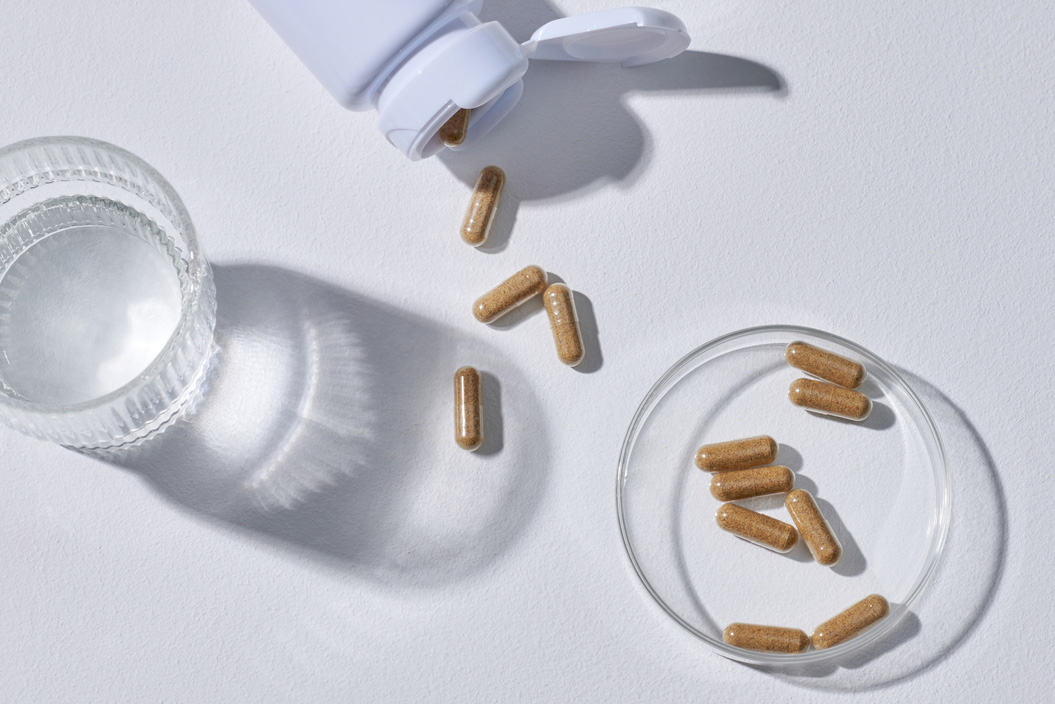Adaptogens are seemingly everywhere these days. The ancient class of herbs and plants, praised for their almost-mystic abilities that help our bodies adapt to stress, are popping up in everything from lattes, to facials, to shampoos. “They have been used for centuries in China and India to support the body’s adrenal glands, reduce stress levels, boost physical and mental stamina, and regulate hormonal balance,” explains Elana Weisberg, L.Ac., director of acupuncture at Tia Clinic. While we’ve known about adaptogens for centuries, their recent buzzy-ness is likely due to a growing appreciation for “holistic, non-pharmacological interventions,” Weisberg says. “Especially for modern-day stressors.”
Among the adaptogens, ashwagandha — an evergreen shrub found growing in Asia and Africa — reigns supreme. Is it the all-natural cure-all for stressed out skin, hair, and bodies? Or simply another wellness buzzword designed to help launch new products? Here’s everything you need to know before adding ashwagandha to your wellness routine.
Meet the Experts
Elana Weisberg, L.Ac., is the director of acupuncture at Tia Clinic.
Hadley King, M.D., is a board-certified dermatologist in New York.
Yael Cooperman, M.D., is the senior manager of medical content and education at Ro.
What is ashwagandha?
Ashwagandha is a type of adaptogen. The root is particularly noted for its effects on reducing inflammation and anxiety, and boosting antioxidants and the immune system.
You can take it orally — most commonly as a supplement, powder, or tincture — or use it topically. “I generally recommend adaptogens alongside other stress-relieving lifestyle recommendations,” Weisberg says, emphasizing that it’s important to treat the root of the problem rather than relying on ashwagandha as a miracle root. But with the right treatment plan, it can be a powerful addition to your wellness routine.
What is ashwagandha used for?
“Ashwagandha is such a cool herb — there are so many ways it can be used,” says Weisberg.
The most compelling evidence points to taking ashwagandha as an oral supplement. A meta-analysis of studies published in 2020 found that ingesting the adaptogen demonstrated a “reasonable efficacy” in treating everything from chronic stress, to insomnia, to anxiety, to type-2 diabetes, to fertility. The best part: No serious adverse side effects were reported in any of the studies analyzed. (The most common downside, according to the report, was some mild gastric discomfort.)
“We don’t have much data about topical use of ashwagandha,” says Hadley King, M.D., a board-certified dermatologist in New York. She does point to two small but interesting studies — one which suggests ashwagandha may be used as a topical treatment of skin cancer, and another which found that using a topical ashwagandha treatment for eight weeks helped reduce facial redness in women. Overall though, we need more research to confidently say that the adaptogen is the holy grail of all your skin and hair concerns.
Here are some of the most common uses for ashwagandha, and the evidence — or lack thereof — behind them.
Reducing inflammation
In the beauty world, one of the biggest claims touted by products boasting ashwagandha on their ingredients lists is the ability to reduce inflammation. Topically, per the study above, there is some evidence this is true — an ashwagandha-boosted face oil may indeed help reduce redness, especially if you have sensitive skin.
The better evidence is for taking an ashwagandha supplement. One study among COVID patients found that taking a gram of ashwagandha daily for a week helped reduce markers of inflammation in the body.
Treating stress and anxiety
Ashwagandha is best known for its ability to help you destress — a large body of research points to its calming effects on the body. One small but illustrative study found that participants who took ashwagandha supplements lowered their levels of the stress hormone cortisol. “Most often, I consider recommending ashwagandha for those expressing a feeling of burnout and intense fatigue,” Weisberg says.
The same study even showed an improvement in participants’ sleep — something Weisberg also sees in her clients who use the adaptogen. “It’s a wonderful herb for stress-related insomnia; it helps with sleep because it helps to relieve anxiety through cortisol regulation,” she explains.
Athletic performance
“There’s some really fascinating research being done on using ashwagandha and other adaptogens to bolster both mental and physical performance,” says Weisberg. A 2021 meta-analysis found that taking up to 1,250 milligrams of ashwagandha daily boosted participants’ strength and cardio output.
Hair health
Dr. King’s number one recommendation for ashwagandha use is for hair loss. She recommends Nutrafol to her patients specifically because it contains the adaptogen. In addition to ingredients like curcumin, which inhibit inflammation, and tocotrienols, which have antioxidant properties, “ashwagandha can help decrease stress and cortisol to help keep hair follicles in the growth phase longer,” Dr. King explains. “I like that they have a study published in the Journal of Drugs in Dermatology that shows data to back up their claims: Women who used the supplements for six months had an increase in hair growth rate, hair density, and improved quality.”
Sexual health
An emerging use for ashwagandha is in the bedroom. “There’s evidence that ashwagandha can help improve sex for women,” says Yael Cooperman, M.D., senior manager of medical content and education at Ro. “One small study showed that parameters like arousal, lubrication, orgasm, and satisfaction all improved significantly with ashwagandha extract compared to placebo. A slightly larger study showed that ashwagandha may help women entering menopause with common symptoms like hot flashes and vaginal dryness and improve their hormone levels.”
One thing to note? Ashwagandha increases testosterone levels. For women dealing with PCOS or hormonal acne, the adaptogen could exacerbate symptoms, Dr. Cooperman adds.
Risks of ashwagandha
While documented risks of taking ashwagandha are few, “it can be a good idea to chat with your doctor before starting any new supplements,” cautions Dr. Cooperman. “Supplements are not closely regulated by the FDA and don’t always contain what they claim to contain (or in the doses they claim to contain it),” she explains. That opens the door for dangerous contamination, so purchasing supplements from a reputable source is key.
Even when they are above board, some supplements can interfere with other medications you may be taking or underlying health conditions you may have. “It’s always helpful to have an experienced practitioner to advise you,” says Weisberg. At the very least, you want to make sure you’re getting a dose that will actually be impactful. “While I love all of the trends that incorporate adaptogens — especially the yummy lattes — it can be challenging and sometimes impossible to understand the dose you’re actually consuming,” Weisberg says. “With a capsule or tincture you’re able to ensure you’re consuming a therapeutic dose and thus have a much better sense of whether or not it’s helpful.”
We only recommend products we have independently researched, tested, and loved. If you purchase a product found through our links, Sunday Edit may earn an affiliate commission.








